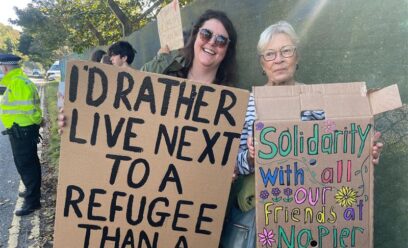We need to talk about how the cost of living crisis is impacting asylum seekers
Posted by IMIX on July 26, 2022In response to the steep rise in cost of living, the government raised asylum support from just £39.63 to £40.85 a week – a difference of just £1.22. Georgia Edwards, Caseworker at Devon and Cornwall Refugee Support (DCRS) writes about how the cost of living crisis is impacting people on asylum support in real life terms.

Source: Unsplash
by Georgia Edwards, Caseworker at DCRS.
The cost of living crisis in the UK has already impacted many of the most vulnerable and financially insecure in the UK – and it is set to continue worsening.
According to the Office of National Statistics (ONS), 87% of adults in the UK have reported an increase in their cost of living between November 2021 and March 2022. In response, the UK government has instituted various measures; means tested payments such as Universal Credit and the State Pension increased by 3.1% in April 2022.
However, this is not enough to keep pace with the rate of inflation. The energy price cap increased by 54% in 2022 and at the time of writing, the Office for Budget Responsibility (OBS) has forecast inflation to average 8% for 2022/23 – more than double its previous forecast.
In line with the 3.1% increase in Universal Credit, asylum support increased from £39.63 to £40.85 per week. This is expected to cover food and non-alcoholic drinks, toiletries, non-prescription medication, laundry, clothing and footwear, travel, communications and any other miscellaneous costs incurred.
The methodology behind the asylum support weekly payment is based on the average amount spent by the lowest 10% income group in the UK. This is despite consultation with charities and non-governmental organisations, such as the Joseph Rowntree Foundation (JRF), suggesting the approach of the Minimum Income Standard (MIS) or increasing payments to 70% of mainstream benefits.
However, the Home Office has stated in their 2021 report that they do not think any of these recommendations an appropriate option; in part because they believe travel and communication are not essential, and that asylum seekers are not required to have a “socially acceptable standard of living but rather just meet their “essential” needs.
Considering that communication and travel are necessities for asylum seekers to enact their rights of obtaining advice from a solicitor and buying essential items, current support can’t possibly stretch to cover rising costs.
It is difficult to see how an individual can lead a healthy and fulfilled life on so little, never mind people fleeing persecution, who have been identified in many studies as being more vulnerable to mental and physical health issues.
A 2022 report by the ONS found that the average cost of living per month for a single person in the UK, with housing and utility costs deducted, is £1,042. Currently, an asylum seeker receives £190.40.
Many service users at Devon and Cornwall Refugee Support (DCRS), especially those with children, have reported struggling even more than usual to cover costs. One of our service users reported not being able to buy her daughter a second-hand school uniform.
This can result in a child not being able to even access education. Whilst the cost of living crisis is being felt by all, the knock-on effect for those on asylum support is acute, needs a voice and has prompted an urgent need to raise what support is available.



